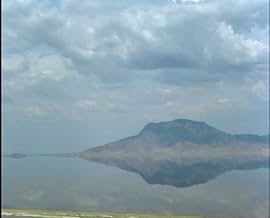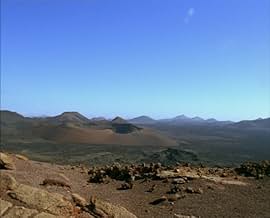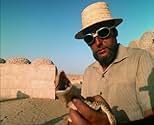Fata Morgana
- 1971
- Tous publics
- 1h 16m
IMDb RATING
6.7/10
4.3K
YOUR RATING
Footage shot in and around the Algerian Sahara Desert, accompanied only by a spoken creation myth and the songs of Leonard Cohen.Footage shot in and around the Algerian Sahara Desert, accompanied only by a spoken creation myth and the songs of Leonard Cohen.Footage shot in and around the Algerian Sahara Desert, accompanied only by a spoken creation myth and the songs of Leonard Cohen.
- Director
- Writer
- All cast & crew
- Production, box office & more at IMDbPro
Featured reviews
Fata Morgana is, by far, one of the weirdest and most perplexing art films I have ever seen. I hesitate to call it a documentary because, while is does have elements of documentation of it's images, the images themselves are so unusual, so hallucinogenic, so unclear, that I wonder whether it was really worth telling this story just so that these images can exist. The film basically is the tale of the earth and the creation of the earth shot from the perspective of an outsider, be it alien or something otherwise indescribable, all taking place in the Sahara desert. The title of the picture relates to the illusion or reflection of images, both real and hallucinated, that people in the desert often witness. These are also known as mirages.
The film opens with a plane landing followed by the plane landing again and then again and again and again and again and again and again. With each plane landing shot, the actual architecture of both the location it is landing at and the plane itself begin to slowly dissolve into one another and grow less and less real and more and more reflective imagery. The imagery in this film only grows more intense and more unusual as the picture continues. The narration of the film tells of the creation of the universe as alarming sexual images of sand and landscape move past the camera. The shots go further and further into the desert and Herzog films whatever he sees and finds. The strangest reflections of the world are on display in the distance while Herzog meets some of the most pure and photogenic collections of outsiders that you are ever likely to see. When the Leonard Cohen soundtrack kicks in, you can be sure that you are in the world of a mad man who is in love with the universe.
I cannot say too much more about this film without ruining anything, but I will say that it is a sobering experience and there's really nothing like it. I love seeing films that are just in classes of their own. This film certainly is a good example of how Herzog loves to intermingle narrative storytelling and documentary film-making into an interchangeable form. Fata Morgana unfortunately does overstay it's welcome just a bit, but by the time it nears it's end the images will most likely be burned into your mind forever. Definitely a must-see for those who are obsessed with the nature and the origin of the universe.
The film opens with a plane landing followed by the plane landing again and then again and again and again and again and again and again. With each plane landing shot, the actual architecture of both the location it is landing at and the plane itself begin to slowly dissolve into one another and grow less and less real and more and more reflective imagery. The imagery in this film only grows more intense and more unusual as the picture continues. The narration of the film tells of the creation of the universe as alarming sexual images of sand and landscape move past the camera. The shots go further and further into the desert and Herzog films whatever he sees and finds. The strangest reflections of the world are on display in the distance while Herzog meets some of the most pure and photogenic collections of outsiders that you are ever likely to see. When the Leonard Cohen soundtrack kicks in, you can be sure that you are in the world of a mad man who is in love with the universe.
I cannot say too much more about this film without ruining anything, but I will say that it is a sobering experience and there's really nothing like it. I love seeing films that are just in classes of their own. This film certainly is a good example of how Herzog loves to intermingle narrative storytelling and documentary film-making into an interchangeable form. Fata Morgana unfortunately does overstay it's welcome just a bit, but by the time it nears it's end the images will most likely be burned into your mind forever. Definitely a must-see for those who are obsessed with the nature and the origin of the universe.
I find Herzog's documentary work to be very uneven. Fata Morgana, a companion piece of sorts to Lessons of Darkness, lacks not only the harrowing spectacle but mostly the discerning eye of an author. It is by comparison amateur looking, aimless pans left and right across the desert the kind of which you would expect from any German tourist equipped with a handycam, the camera left running from the window of a car picking up all kinds of meaningless images, wire fences, derelict buildings and patches of dirt going through the lens in haphazard order, intercut with shots of sand dunes. At one point Herzog encounters a group of starved cattle rotting away in the sand, yet the image is presented much like you and me would, perhaps worse, the camera peering hand-held from one cattle to the next. For a documentary that attempts to be a visual feast, a hypnotic, surreal excursion in uncharted landscapes, it lacks the visual orchestration and conviction of a disciplined author. It's all over the place, half-hearted and tedious, Mayan creation myths recited in voice-over, then some other text Herzog fancied for literature. It's not until near the end that Fata Morgana jumps alive through a series of bizarre encounters. First with a man and a woman playing music in a room, the man singing in a distorted voice through a mic, both of them apathetic in their task. A man holding up a turtle. A group of old people trying to get out of some holes in the ground. Other than that, this one seems to have very little of substance to offer or visual splendor to offer.
I saw FATA MORGANA at its US premiere in 1972 and again in 1975. The film remained in my (inexact) memory as possible model or prototype of the "surreal documentary", and I think I had recollections of Herzog's long pans and tracking shots in a back chamber of my mind while filming material in the Dolomites that I later combined with manipulated WWI footage in my own audio-visual work GEBIRGSKRIEGSPROJEKT. Having lived in Austria for 17 years and now being fluent in the language of FATA MORGANA's narration, I was eagerly looking forward to re-encountering the film on DVD.
Unfortunately, I have to admit that I was rather disappointed. The terms of my reaction are largely defined by Werner Herzog's own commentary on the German DVD. That he wanted to make a documentary as if from the point of view of visitors from another galaxy is a good idea and a commendable ambition, but I think the hypothetical visitors from Andromeda would have arrived with a far more anthropologically organized structure of viewing than what Herzog here presents. It would however be unfair to call the film pretentious: it's just not that well thought out. There are indeed some strong images (not only those of the desert mirages ...) that could have been used effectively as expanding material in a more narratively oriented film, or served as basis for a more "experimental" work, such as those of Stan Brakhage (who Herzog professes to admire), but these images are too often weakened by sloppy camera movement or flaccid editing.
I found the use of heterogeneous music (Blind Faith, Leonard Cohen, the Kyrie from one of Mozart's masses) arbitrary and unconvincing. Chance-derived juxtapositions are stimulating now and then, but this is no well-thought-out dialectically surreal counterpoint of image and sound that could really cut into the eye and ear.
Some sequences in the later part of the film (a foreign aid worker having African children recite "der Blitzkrieg ist Wahnsinn", or a scene where German tourists hop up and down in little volcanic craters on Lanzarote) lapse into the ridiculous and unfortunately retrospectively lower the level of what came before.
BUT Werner Herzog is a great filmmaker who has in other works made immense contributions to his art. FATA MORGANA may be one of his weaker films, but I suspect it was essential to his development. I'ts a pleasure and a challenge to view and to think about this film.
Unfortunately, I have to admit that I was rather disappointed. The terms of my reaction are largely defined by Werner Herzog's own commentary on the German DVD. That he wanted to make a documentary as if from the point of view of visitors from another galaxy is a good idea and a commendable ambition, but I think the hypothetical visitors from Andromeda would have arrived with a far more anthropologically organized structure of viewing than what Herzog here presents. It would however be unfair to call the film pretentious: it's just not that well thought out. There are indeed some strong images (not only those of the desert mirages ...) that could have been used effectively as expanding material in a more narratively oriented film, or served as basis for a more "experimental" work, such as those of Stan Brakhage (who Herzog professes to admire), but these images are too often weakened by sloppy camera movement or flaccid editing.
I found the use of heterogeneous music (Blind Faith, Leonard Cohen, the Kyrie from one of Mozart's masses) arbitrary and unconvincing. Chance-derived juxtapositions are stimulating now and then, but this is no well-thought-out dialectically surreal counterpoint of image and sound that could really cut into the eye and ear.
Some sequences in the later part of the film (a foreign aid worker having African children recite "der Blitzkrieg ist Wahnsinn", or a scene where German tourists hop up and down in little volcanic craters on Lanzarote) lapse into the ridiculous and unfortunately retrospectively lower the level of what came before.
BUT Werner Herzog is a great filmmaker who has in other works made immense contributions to his art. FATA MORGANA may be one of his weaker films, but I suspect it was essential to his development. I'ts a pleasure and a challenge to view and to think about this film.
Fata Morgana (1971)
* 1/2 (out of 4)
I knew what I was getting into with this film so I actually read the production notes to before getting to the movie itself and I must admit that the notes were a lot more entertaining. Now, I certainly see why some might love this movie and call it a masterpiece but at the same time, to me, this is just a movie that's "art" for the sake of being art. There's really an interesting movie to discuss here but it's just not an entertaining one and no matter what type of art you're trying to create, the importance of being entertaining can never be overlooked. There's really no way to fully describe or give a plot detail of this film but it's pretty much Herzog's documentary on why images are so important. Shot in Africa, we get all sorts of images of the desert as well as various other tracking shots, which are shown with narration as well as a soundtrack by Leonard Cohen and Blind Faith. I'm really not sure what to say about this film except that it didn't work for me and Herzog's attempt to show the visuals as "aliens looking around" just didn't work. This is something Herzog would attempt later in his career and to me these type of thoughts have always been a miss. I'm sure Herzog has something to say with the film but I don't see it being said in the film itself. I've read his comments and listened to parts of the commentary where he explains things but if it weren't for this, the movie itself wouldn't have said anything. There are certainly some surreal moments and there's no question that a brilliant mind is behind all the images but in the end the film left me cold and bored, which is something I can't say about too many of Herzog's films as he's one of my favorites.
* 1/2 (out of 4)
I knew what I was getting into with this film so I actually read the production notes to before getting to the movie itself and I must admit that the notes were a lot more entertaining. Now, I certainly see why some might love this movie and call it a masterpiece but at the same time, to me, this is just a movie that's "art" for the sake of being art. There's really an interesting movie to discuss here but it's just not an entertaining one and no matter what type of art you're trying to create, the importance of being entertaining can never be overlooked. There's really no way to fully describe or give a plot detail of this film but it's pretty much Herzog's documentary on why images are so important. Shot in Africa, we get all sorts of images of the desert as well as various other tracking shots, which are shown with narration as well as a soundtrack by Leonard Cohen and Blind Faith. I'm really not sure what to say about this film except that it didn't work for me and Herzog's attempt to show the visuals as "aliens looking around" just didn't work. This is something Herzog would attempt later in his career and to me these type of thoughts have always been a miss. I'm sure Herzog has something to say with the film but I don't see it being said in the film itself. I've read his comments and listened to parts of the commentary where he explains things but if it weren't for this, the movie itself wouldn't have said anything. There are certainly some surreal moments and there's no question that a brilliant mind is behind all the images but in the end the film left me cold and bored, which is something I can't say about too many of Herzog's films as he's one of my favorites.
--- most of Herzog's films are best watched with the commentary. His overpowering germanesque English always 'pumps' up the importance of the events/images of his films. In the DVD commentary of this film Crispin Glover is invited along to give his thoughts also.
I am very partial to Herzog's films. That said, I find this one toward the top of his heap. There is a certain 'rawness' to the structure and sequences of this film. I believe that most of it was shot during other projects and pieced from footage that was taken in the Sahara. The early parts of the film are the strongest images, the equivalent of moving paintings, showing care in subtle differences in the landscape. There is an erie science fiction quality to the early part of the film that might even be reminiscent of 'Dune'--- mostly for the desert images.
The later part of the film is more about a human interaction with the landscape. These people are not actors but ordinary people that Herzog (i'm sure) told them to stand around acting weird--- or maybe genuinely acting foreign to what we know---- many of the people were being filmed for the first time (he loves sophisticating the natives--- tricking them with his modern equipment---
---one bit of advice--- don't attempt to watch this if you have distractions around--- you have to be in a quiet mood to sustain watching it--- (even I have a hard time sitting through it)---hence my recommend of watching it with the commentary
I am very partial to Herzog's films. That said, I find this one toward the top of his heap. There is a certain 'rawness' to the structure and sequences of this film. I believe that most of it was shot during other projects and pieced from footage that was taken in the Sahara. The early parts of the film are the strongest images, the equivalent of moving paintings, showing care in subtle differences in the landscape. There is an erie science fiction quality to the early part of the film that might even be reminiscent of 'Dune'--- mostly for the desert images.
The later part of the film is more about a human interaction with the landscape. These people are not actors but ordinary people that Herzog (i'm sure) told them to stand around acting weird--- or maybe genuinely acting foreign to what we know---- many of the people were being filmed for the first time (he loves sophisticating the natives--- tricking them with his modern equipment---
---one bit of advice--- don't attempt to watch this if you have distractions around--- you have to be in a quiet mood to sustain watching it--- (even I have a hard time sitting through it)---hence my recommend of watching it with the commentary
Did you know
- TriviaOne of two films from 1971 to feature a trio of songs by Leonard Cohen, the other being Robert Altman's McCabe and Mrs. Miller.
- ConnectionsFeatured in Je suis ce que sont mes films (1978)
- SoundtracksHey, That's No Way to Say Goodbye
Written and Performed by Leonard Cohen
- How long is Fata Morgana?Powered by Alexa
Details
Contribute to this page
Suggest an edit or add missing content























